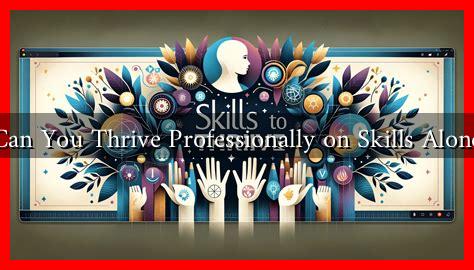-
Table of Contents
Can You Thrive Professionally on Skills Alone?
In today’s fast-paced and competitive job market, the question of whether one can thrive professionally based solely on skills is more relevant than ever. While technical skills and expertise are undeniably important, the landscape of professional success is multifaceted. This article explores the role of skills in career advancement, the importance of soft skills, networking, and continuous learning, and provides insights into how individuals can position themselves for success.
The Importance of Skills in the Modern Workplace
Skills are the foundation of any professional career. They encompass both hard skills—specific, teachable abilities such as coding, data analysis, or graphic design—and soft skills, which include interpersonal abilities like communication, teamwork, and problem-solving. According to a report by the World Economic Forum, over 50% of all employees will need reskilling by 2025 due to technological advancements. This statistic underscores the importance of continuously updating one’s skill set to remain relevant in the workforce.
Hard Skills vs. Soft Skills
While hard skills can get you through the door, soft skills often determine how far you can go. Here’s a breakdown of both:
- Hard Skills: These are quantifiable and often learned through formal education or training. Examples include:
- Programming languages (e.g., Python, Java)
- Data analysis and statistical software (e.g., R, Excel)
- Technical writing and documentation
- Project management methodologies (e.g., Agile, Scrum)
- Soft Skills: These are more subjective and relate to how you interact with others. Examples include:
- Effective communication
- Emotional intelligence
- Adaptability and flexibility
- Leadership and teamwork
Research indicates that employers often prioritize soft skills over hard skills when hiring. A LinkedIn survey found that 92% of talent professionals believe that soft skills are just as important, if not more so, than hard skills. This highlights the necessity of developing a well-rounded skill set.
The Role of Networking
In addition to skills, networking plays a crucial role in professional success. Building relationships within your industry can open doors to opportunities that skills alone may not provide. Here are some key points about networking:
- Access to Opportunities: Many job openings are filled through referrals rather than traditional applications.
- Mentorship: Networking can lead to mentorship opportunities, providing guidance and support from experienced professionals.
- Industry Insights: Engaging with peers can keep you informed about industry trends and best practices.
For instance, a study by the Bureau of Labor Statistics found that about 70% of jobs are found through networking. This statistic emphasizes the importance of cultivating professional relationships alongside skill development.
Continuous Learning and Adaptability
In a world where change is the only constant, the ability to learn and adapt is invaluable. Professionals who commit to lifelong learning are more likely to thrive. Here are some strategies for continuous learning:
- Online Courses: Platforms like Coursera and Udemy offer courses on a wide range of topics.
- Workshops and Seminars: Attending industry-related events can enhance your knowledge and skills.
- Reading and Research: Staying updated with industry publications and books can provide new insights.
According to a report by McKinsey, companies that invest in employee training see a 24% higher profit margin than those that do not. This statistic illustrates the value of continuous learning not just for individuals, but for organizations as well.
Conclusion
While skills are undoubtedly a critical component of professional success, they are not the sole factor. A combination of hard and soft skills, effective networking, and a commitment to continuous learning is essential for thriving in today’s competitive job market. As the landscape continues to evolve, professionals must adapt and grow, ensuring they are not only skilled but also well-connected and knowledgeable. In summary, to truly thrive professionally, one must embrace a holistic approach that values skills, relationships, and lifelong learning.
For more insights on professional development, consider exploring resources from the Forbes Human Resources Council.

